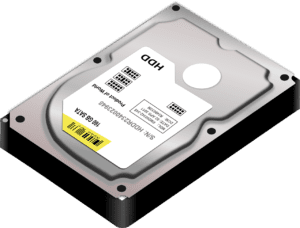Both HDD and SSD are secondary storage devices used for the same purpose which is storing data or information. In terms of speed, size, performance, design and in other aspects, both are completely different from one another.
The main difference between them is, SSD is faster than HDD storage as it uses a non-volatile technology named NAND flash memory.
Difference between HDD and SSD in Tabular form ?
| Basis | SOLID STATE DRIVE (SDD) | HARD DISK DRIVE (HDD) |
|---|---|---|
| Full Form | Solid State Drive | Hard Disk Drive |
| Data Storage | In this, no rotating part is present, instead, semiconductor chips are used namely flash chips to store data | In this type of Storage Device, Data are stored on a rotating platter magnetically |
| Speed | It uses a non-volatile technology named NAND flash memory which makes it faster and preserves your data for a longer time | It is slower than SDD when it comes to read or write data as the transfer rate depends upon the speed of the rotating platter |
| Cost | SDD is more expensive as compared to HDD | It is cheaper than SDD |
| Noise | No noise is produced as it doesn't have any moving part for storing data | As and when the computer boots up, the platter starts moving as a result noise and vibration are produced |
| Capacity | When it comes to capacity SDD falls behind of HDD | In terms of Capacity, HDD ranges from 500 GB as the base hard drive capacity. It can hold more data as compare to SDD |
| Durability and Reliability | More reliable and durable | Less durable and reliable as there always have some possibilities of mechanical failure |
| Moving Components | It doesn't consist of any moving components but has two main components flash controller and NAND flash memory | It consists of moving components such as acutators,Magnetic platter,Read-Write arms and other parts |
| Power Consumption | Less | HDD requires more energy, due to the fact of having moving parts that consume more energy to rotate itself |
| Fragmentation Issue | It doesn't have fragmentation Issue | It has fragmentation Issue |
HDD (Hard Disk Drive)
HDD stands for Hard disk drive which uses platters or disk to store data and can read or write data from continuously rotating platters by using read/write head.

It consists of a stack of platters that automatically start spinning as soon as computer system switched on, enabling it to store and retrieve a large amount of data from these electromagnetically charged surfaces.
These platters are further divided into sectors, tracks, and cylinders.
Cylinder—> Set of Tracks —> Segments of Sectors
Head or an arm located at a fixed point on both sides of platter frequently sense the tracks of the spinning platters as and when it required to read or write data.
SSD (Solid State Drive)
Solid State Drive, a competitive storage media for HDD which uses a non-volatile storage media technology named NAND flash memory ( A technology that is being used in USB flash drives, SD Cards, and digital camera).

A SSD comprises of a flash controller which responsible for controlling operations related to read or write data and NAND flash memory chip.
These are made with FGRs ( floating gate transistors), allowing it to keep retain data which makes it non-volatile.
In this, the number of write cycle are limited as the cells where data get stored may wear out due to write operation.
